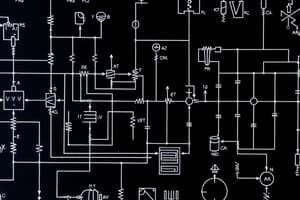Podcast
Questions and Answers
What is the function of a switch in an electric circuit?
What is the function of a switch in an electric circuit?
- To act as a conductor between components
- To open or close the circuit (correct)
- To represent all circuit components
- To provide a power source
What determines if a circuit is classified as series?
What determines if a circuit is classified as series?
- The same current flowing through all components (correct)
- The presence of a switch within the circuit
- The use of insulated wires for connections
- Multiple paths for current flow
What happens in a series circuit if one component fails?
What happens in a series circuit if one component fails?
- Only the failed component will stop working
- Current will bypass the failed component
- The failed component will continue to function intermittently
- The entire circuit will stop functioning (correct)
Which of the following statements is true about a parallel circuit?
Which of the following statements is true about a parallel circuit?
What is the role of a load within a simple circuit?
What is the role of a load within a simple circuit?
Flashcards are hidden until you start studying
Study Notes
Electricity Overview
- Electric circuits are closed loops that allow the flow of electrons.
- Components are interconnected through electrical wires and a power source, commonly a battery.
- The starting point of electron flow is termed the source, while the end point is called the return.
Electric Circuit Symbols
- Each component in an electric circuit is represented by a specific symbol in circuit diagrams.
- Understanding these symbols is essential for interpreting and creating circuit layouts.
Simple Circuit Components
- Cell: Acts as the power source in the circuit.
- Load: Also known as a resistor, typically represented by a light bulb that illuminates when the circuit is active.
- Conductors: Generally made of copper with no insulation, connecting the load to the power source.
- Switch: Functions as a gap in the circuit, allowing the user to open or close the circuit.
Series Circuit Characteristics
- In a series circuit, the same current flows through all components without branching.
- Designed with a single path for current; if one component fails (e.g., a bulb), the entire circuit stops functioning.
- Common example includes household decorative string lights.
Parallel Circuit Characteristics
- Parallel circuits allow electric current to flow through multiple paths simultaneously.
- Each component maintains a constant voltage across its terminals, independent of others.
Studying That Suits You
Use AI to generate personalized quizzes and flashcards to suit your learning preferences.




